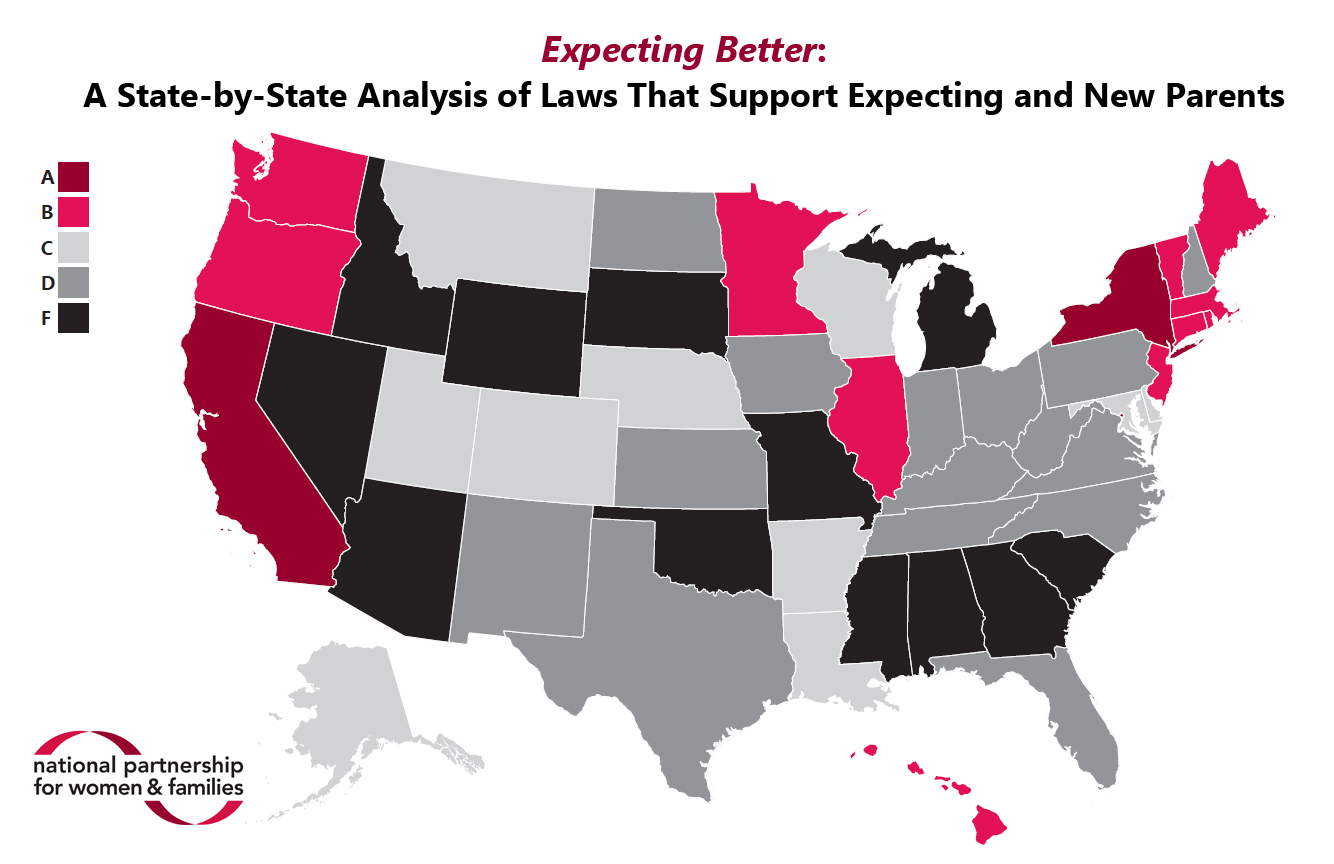
In the indelible theme song of The Beverly Hillbillies, a TV show that desperately needs to be remade, the titular hillbilly family is told that “California is the place you oughta be.” The same advice might today be offered to working women women who would like to start a family.
California has the most family-friendly state employment laws in the U.S., according to National Partnership for Women & Families, which released its fourth annual report, Expecting Better, on Aug. 3. The study considers such factors as paid family leave laws—which California was the first state to have—job protection for new parents, accommodations for pregnant and breastfeeding women and the ability for partners to use paid sick days to take their spouses or co-parents to medical appointments. New York and the District of Columbia also scored well on the analysis.
Currently, California, New Jersey, Rhode Island and, starting in 2018, New York are the only states which require paid family leave for new parents. California has had a family leave insurance program since 2002, but the law was expanded this year so that in 2018 workers can receive up to 70% of their income while away from work to take care of a family health issue.
The most difficult states to be a working mom? Alabama, Arizona, Georgia, Idaho, Michigan, Mississippi, Missouri, Nevada, Oklahoma, South Carolina, South Dakota and Wyoming. These are states that offer few protections for working parents beyond those that are mandated by Family Medical Leave Act, that is, they can get 12 weeks of unpaid leave a year, with health benefits, if they work in a company that has more than 50 employees and have worked there for at least a year. These weeks can be used as maternity leave, or after a child is adopted or fostered, or if they’re ill or need to care for an immediate family member who is ill. But it’s all unpaid.
Of course, many businesses offer benefits to their employees above and beyond what the state mandates; the tech industry has been a leader in this area. Netflix offers unlimited paid parental leave for the first year, Apple offers egg freezing services as does Facebook, which also gives employees a $4000 “baby bonus.” Google offers $500 in “baby bonding bucks,” but also guarantees the children of employees $1000 a month until they’re 23 if their parent dies. The Gates Foundation is not technically a tech company, but gets its money from one; it offers a full year paid maternity and paternity leave.
Read More: These are the Companies with the Best Parental Leave Policies
Those who argue against laws mandating paid parental leave point to these firms as examples of how the market will fix this issue without the government introducing new laws. Tech companies are always competing for talent and do what they need to do to lure in the best new employees. If companies are forced to offer paid maternity leave, critics argue, bosses might balk at hiring women.
But typically benefits such as those offered by tech firms are accorded only to professional, highly skilled and white collar workers. Those at the other end of the employment spectrum, hourly workers or those who work on-demand (meaning different hours every week, on a variable schedule set by employers at short notice), have the worst benefits and the hardest time when they or their partners are pregnant. Or when their kids are sick.
Those parents often struggle to manage both work and a baby and/or a pregnancy and can become unemployed, leading to worse financial pressure and a spiral into poverty. “Approximately 68% of children live in families in which all parents work,” notes the study. “This means that, in two-parent families, it is highly unlikely that one parent will stay home full time to care for a new child while the other returns to work and, in single-parent families, the parent’s bread-winning role is especially important because it is often the sole source of income.”
And of course, the situation is most difficult for single parents, of which there is an increasing number. According to Pew, more than a quarter of all American kids live with just one parent, up from 9% 50 years ago. When that parent has to take time off from work, there is no other income to fall back on. And, alas, poor people only hit the jackpot while out hunting for food in old TV shows.
More Must-Reads from TIME
- Donald Trump Is TIME's 2024 Person of the Year
- Why We Chose Trump as Person of the Year
- Is Intermittent Fasting Good or Bad for You?
- The 100 Must-Read Books of 2024
- The 20 Best Christmas TV Episodes
- Column: If Optimism Feels Ridiculous Now, Try Hope
- The Future of Climate Action Is Trade Policy
- Merle Bombardieri Is Helping People Make the Baby Decision
Contact us at letters@time.com